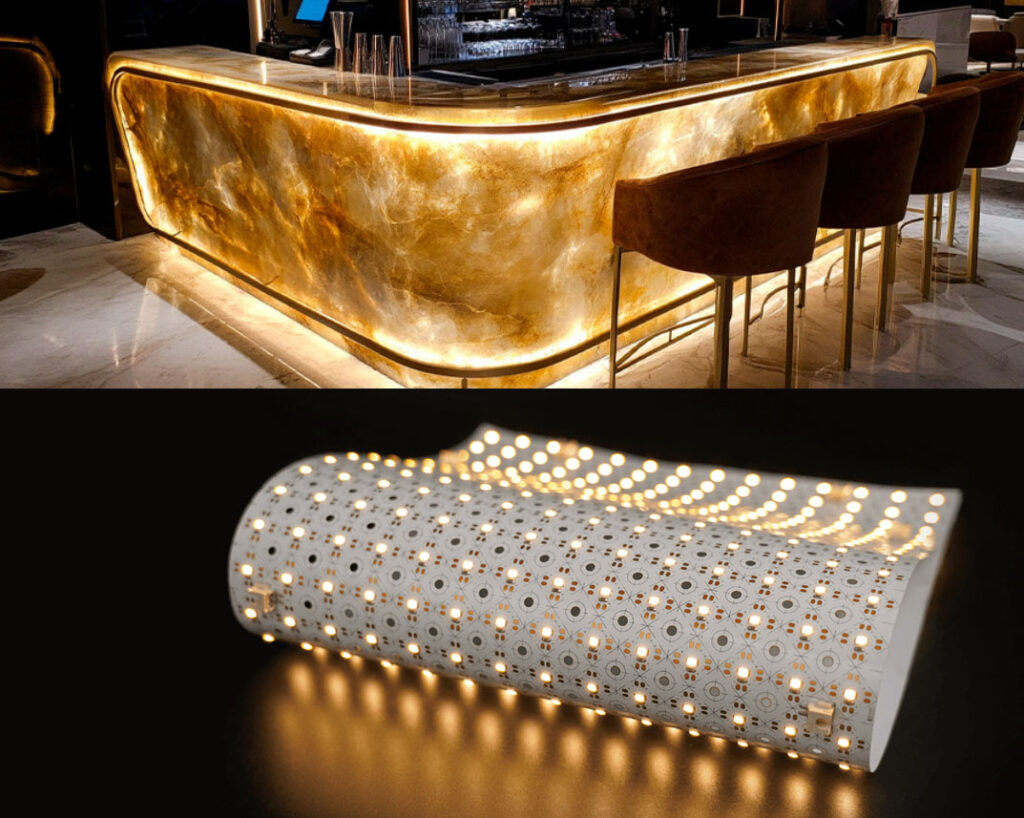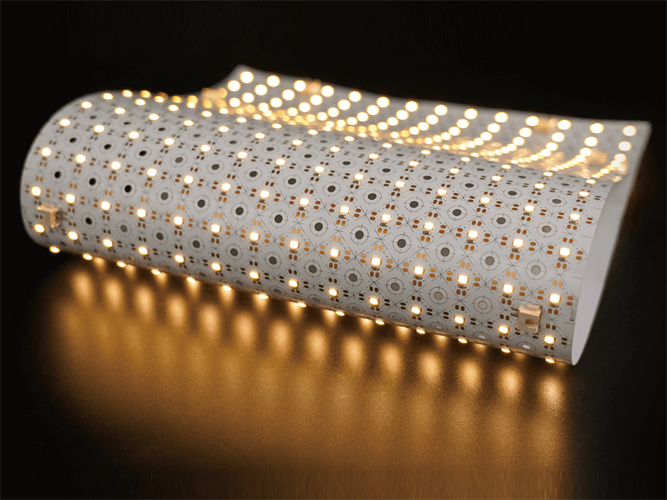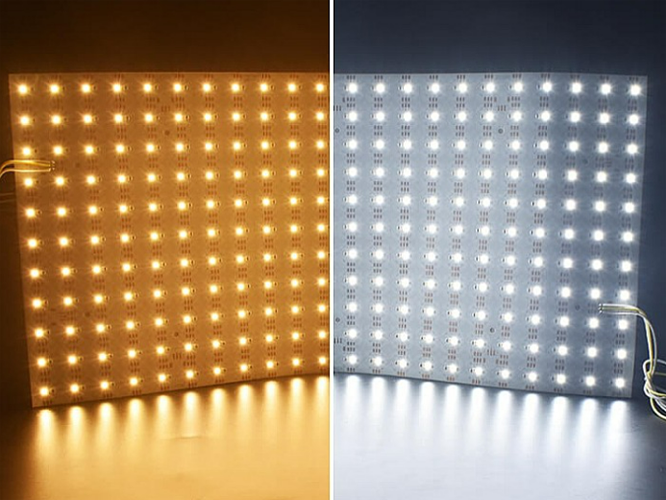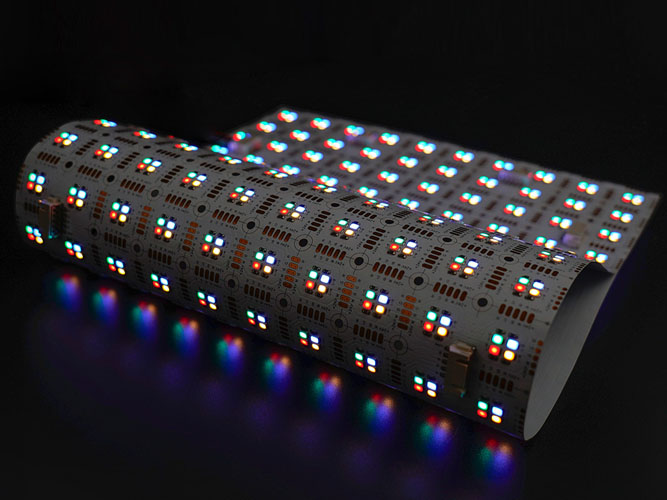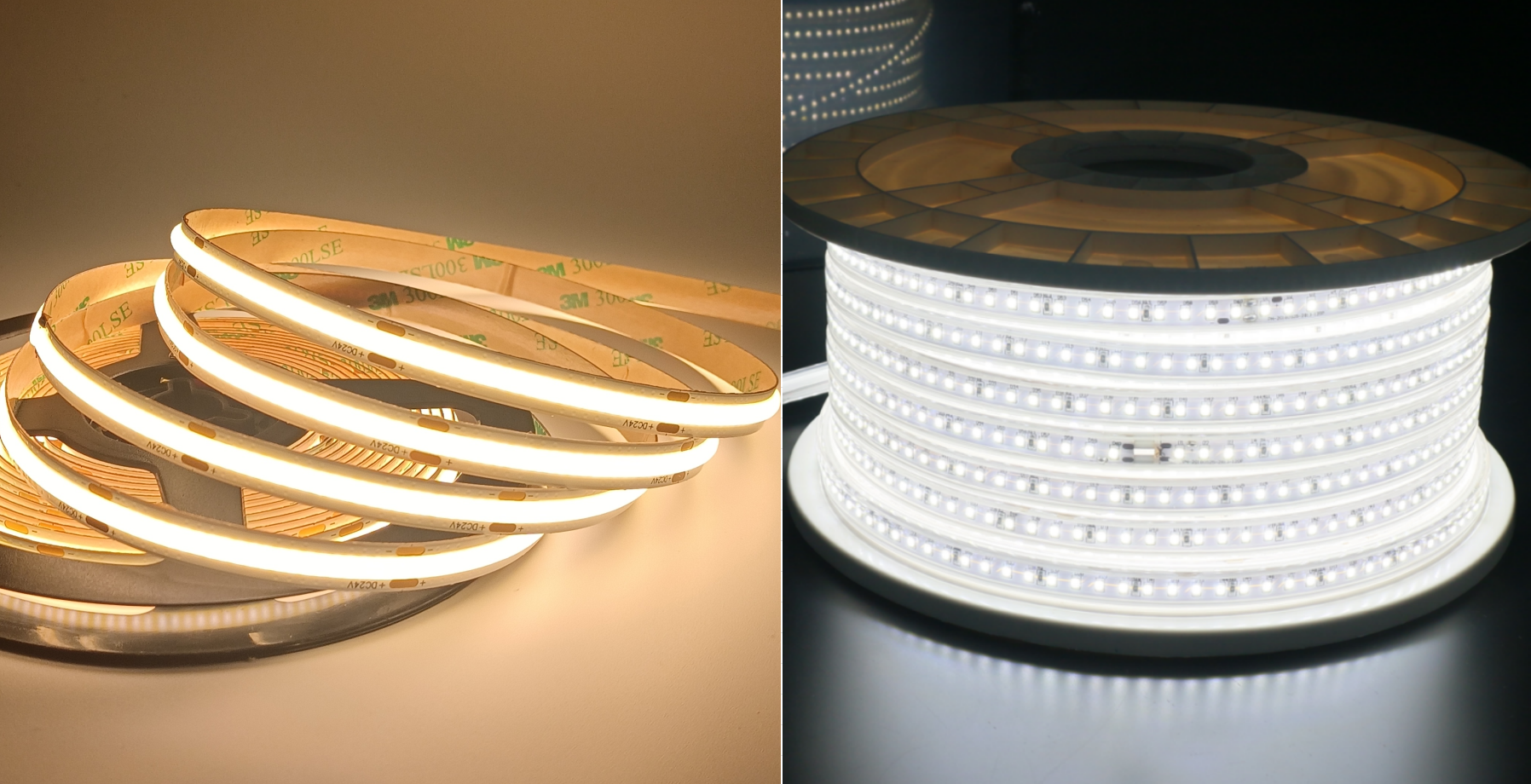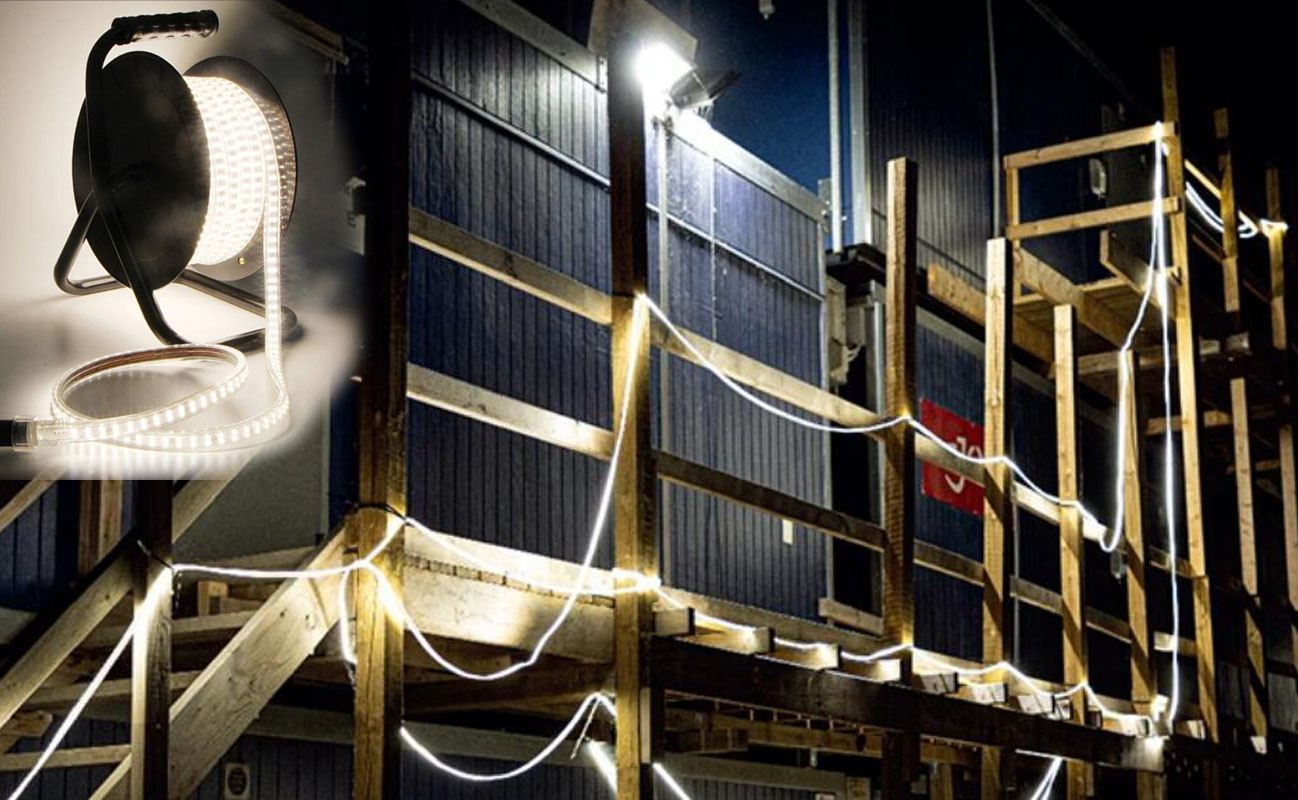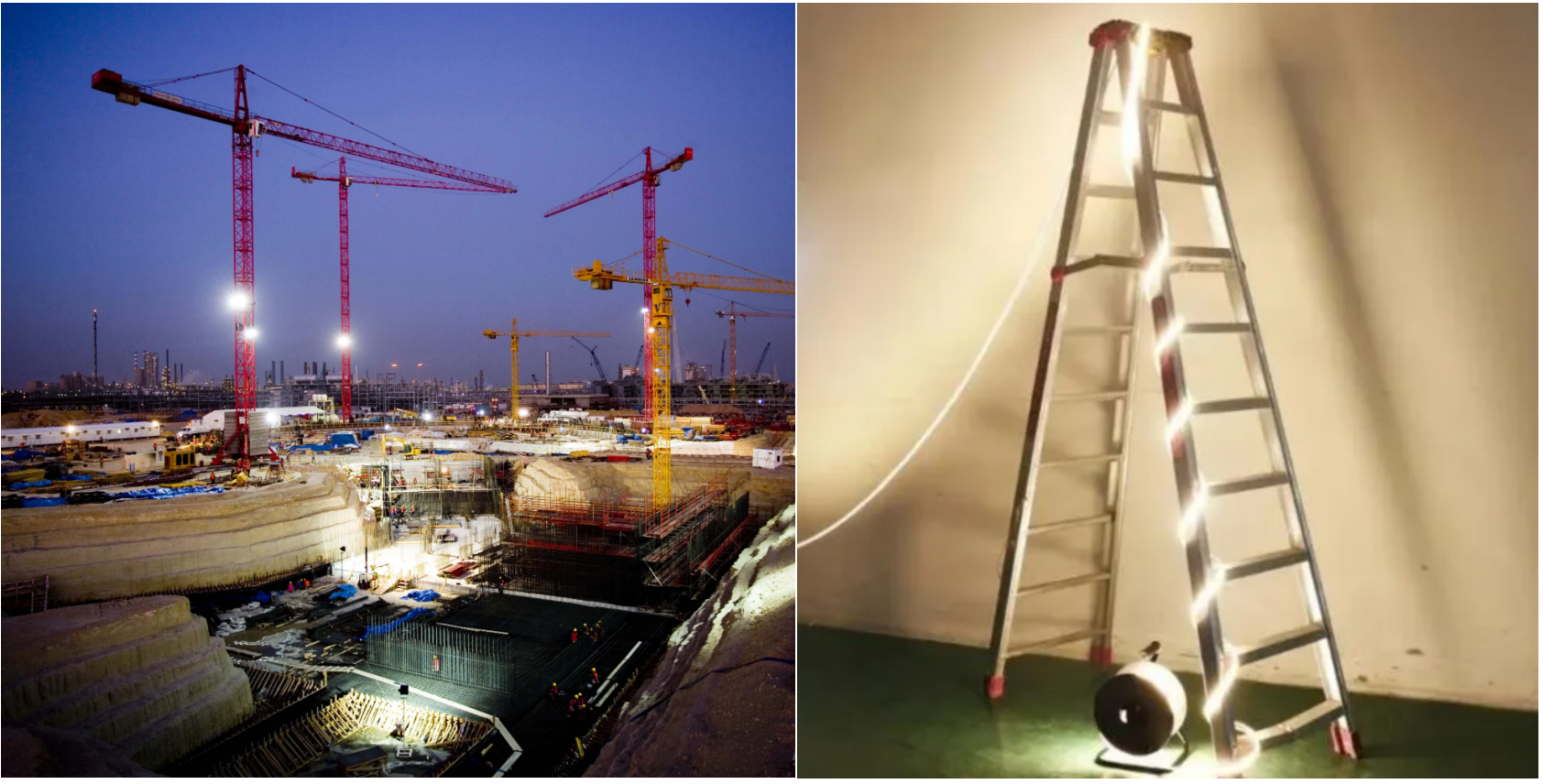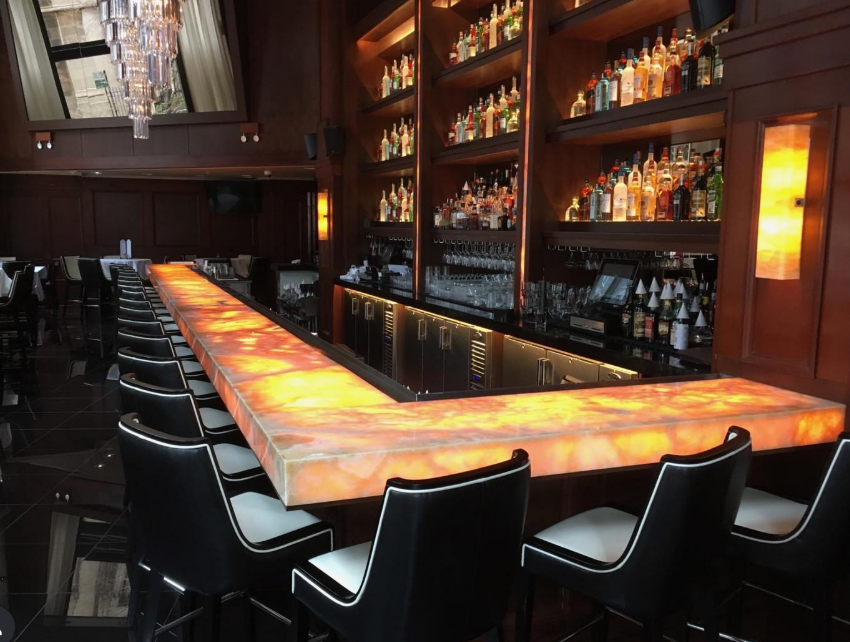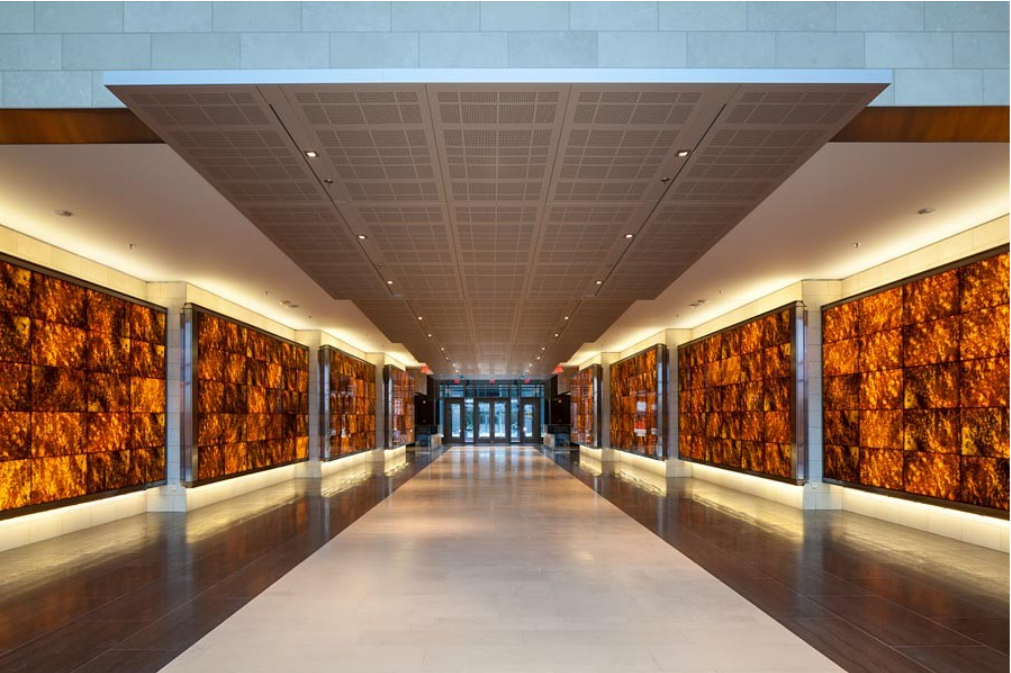
Uneven brightness, hot spots, and poor diffusion are common issues in backlit marble projects. LED Sheet Light solves these challenges with uniform, high-density illumination. Here is the complete technical guide.
Backlit marble and stone feature walls use high-density LED sheet lighting behind translucent marble, onyx, quartzite, or engineered stone to create a uniform glowing effect. Achieving a perfect result requires the right light source, adequate installation depth (20–80 mm), smooth diffusion, and proper brightness. LED Sheet Light is the best solution because it provides consistent surface illumination, eliminates visible LED dots, and adapts to irregular stone thickness. This guide explains installation depth, color temperature, LED sheet selection, and engineering tips for flawless stone backlighting.
Compared with standard decorative lighting, backlit marble requires precise optical engineering. The stone’s translucency, thickness, and natural variation make uniform illumination difficult without the right light source. Let’s break down the science, challenges, and best practices behind perfect backlit stone feature walls.
Why Does Marble Work Well for Backlighting?
Marble diffuses light naturally due to its crystalline structure. Backlighting enhances its veins, depth, and color, turning the material into a luminous focal point.

Marble and other translucent stones (such as onyx, quartzite, and alabaster) contain microcrystalline minerals that scatter light. When illuminated from behind, these crystals refract light in multiple directions, creating a soft, glowing effect.
Key optical characteristics:
Translucency ranges 10–40% depending on mineral content
Veins absorb light differently, creating depth and contrast
Stone thickness varies between 12–30 mm, affecting brightness
Darker stones require higher luminance to achieve the same effect
Because of these natural variations, the lighting must produce uniform, high-density illumination to avoid patches and shadows.
To understand the lighting source behind backlit stone, read this: LED Sheet Light vs LED Strip — What’s the Difference?
Why Do Many Backlit Marble Installations Look Uneven?
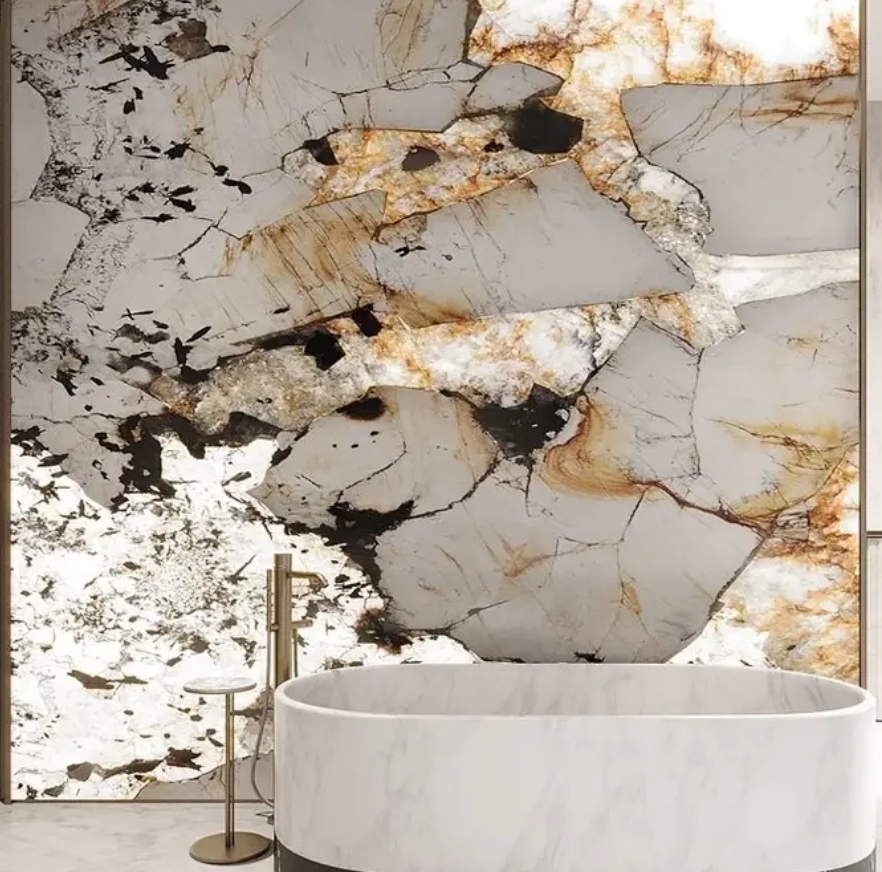
Most failures come from using LED strips, insufficient diffusion, irregular stone thickness, or inadequate installation depth.
Backlit marble frequently fails due to:
1. LED strip spacing too wide
LED strips typically have 16–28 mm spacing, causing visible banding and hot spots.
2. Marble thickness variation
Thinner areas glow brighter, thicker areas appear dimmer.
3. Poor diffusion
Without a diffuser, LEDs appear as points instead of a smooth sheet of light.
4. Insufficient cavity depth
LED strips often require 60–100 mm to diffuse properly.
Most wall installations don’t allow this much space.
5. Inconsistent installation
Any tilt or uneven mounting will immediately show through the stone.
LED Sheet Light eliminates these issues with its high-density surface lighting.
Why Is LED Sheet Light the Best Light Source for Backlit Marble?
LED Sheet Light provides full-surface illumination, eliminating hot spots and achieving uniform brightness with minimal installation depth.
LED sheet modules (392 / 784 / RGBW versions) are engineered to illuminate stone surfaces evenly.
✔ Matrix LED Layout
Hundreds of LEDs arranged in a uniform grid eliminate shadows and bright lines.
✔ Thin Profile
Only 2–4 cm cavity depth needed, ideal for wall installations.
✔ Zero Hot Spots
LED density is high enough to eliminate visible dots.
✔ Flexible Cutting
Modules can be cut into smaller sections to match stone shapes.
✔ High Brightness
Suitable even for darker or denser stones like honey onyx or certain marbles.
✔ Stable for 24/7 Use
Perfect for hospitality environments such as hotels, bars, and retail stores.
What Installation Depth Is Required Behind Backlit Marble?
Typical installation depth is 20–80 mm depending on stone type and brightness level.
| Stone Type | Thickness | Translucency | Depth Needed |
|---|---|---|---|
| White marble | 12–18 mm | High | 20–30 mm |
| Onyx | 15–20 mm | Very high | 25–40 mm |
| Quartzite | 20–30 mm | Medium | 40–60 mm |
| Dark marble | 20–30 mm | Low | 50–80 mm |
Installation tips:
If cavity < 25 mm → add a 2–3 mm frosted acrylic diffuser
Maintain consistent spacing between sheet and stone
Seal the cavity to prevent external light leak
Use reflective backing to maximize light output
If you want step-by-step installation instructions, check: How to Backlight Translucent Stone — Beginner Guide + Pro Tips
What Color Temperature Is Best for Backlit Marble?
3000K–4000K works best for marble feature walls. Warm tones enhance veins; neutral white preserves natural colors.
3000K Warm White
Enhances gold, cream, and honey tones
Suitable for luxury hotels, bars, and restaurants
3500K–4000K Neutral White
Most natural look
Good for commercial design, retail, lobbies
RGBW / Pixel RGBW
Ideal for dynamic installations or artistic walls
Suitable for clubs, lounges, exhibitions
LED Sheet Light vs LED Strip — Which One Is Better for Marble?
LED Sheet Light provides superior diffusion, uniformity, and lower installation depth.
LED strips are unsuitable for large stone panels.
| Feature | LED Sheet Light | LED Strip Light |
|---|---|---|
| Uniformity | ⭐⭐⭐⭐⭐ | ⭐⭐ |
| Hot Spots | None | Visible |
| Installation Depth | 20–40 mm | 60–100 mm |
| Coverage | Full surface | Linear coverage |
| Brightness | High | Medium |
| Best Use | Marble & stone walls | Edge / linear lighting |
Conclusion:
For professional backlit stone feature walls, LED sheet is the only proper choice.
How to Ensure a Perfect Backlit Marble Wall?
Use proper diffusion, correct spacing, consistent brightness, and pre-test lighting with the stone slab.
✔ Use frost diffuser panels
Marble behaves differently based on its internal structure.
✔ Ensure flat installation
Any unevenness will show through the stone.
✔ Avoid lighting gaps
Place LED sheets edge-to-edge.
✔ Perform lightbox testing before installation
Different marble slabs vary in translucency.
✔ Use aluminum backing plate
Improves thermal stability and reflects light forward.
How to Choose the Right LED Sheet Model?
392 for standard brightness, 784 for tunable white, RGBW for decorative or color-changing applications.
Where Are Backlit Marble & Stone Feature Walls Used?
Backlit marble walls are widely used in hospitality, retail, commercial, and luxury residential design.
Common applications:
Hotel lobby feature walls
Luxury restaurant partitions
Bar counters and backdrops
Retail display walls
SPA & wellness centers
Reception desks
Private homes and villas
High-end bathrooms
Installation Tips for Designers & Contractors
Test illumination, maintain flat surfaces, ensure ventilation, and plan wiring layout carefully.
✔ Test with actual stone slab
Marble slabs vary greatly.
✔ Leave ventilation gaps
LED sheets need minimal airflow.
✔ Choose correct driver placement
Keep it accessible.
✔ Use proper wire gauge
Minimize voltage drop.
✔ Maintain clean reflective chamber
Prevents dark spots.
Backlit onyx behaves differently from marble. Learn more here: Backlit Onyx Lighting Guide
Conclusion
Backlit marble and stone feature walls create a luxurious, dramatic visual effect.
Using LED Sheet Light ensures consistent brightness and perfect uniformity, making it the best solution for high-end architectural applications.
Looking for LED sheet lighting for your backlit onyx project?
AiDiWatt Lighting provides 392, 784, and RGBW LED sheets with factory-direct support.
Contact us for a fast quote and technical guidance.
